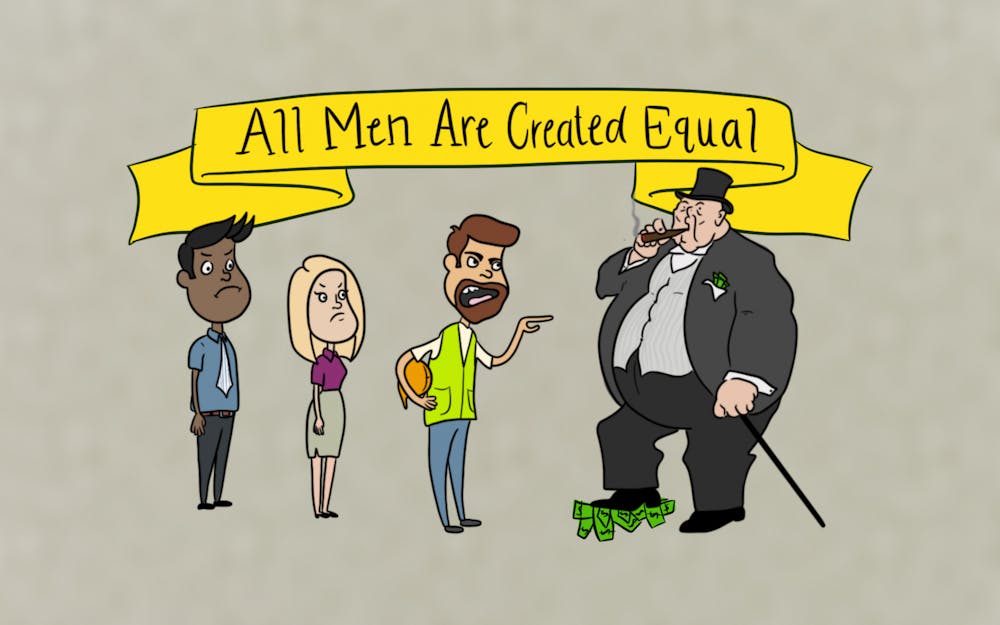Elon Musk, currently the world’s richest man, has always been wealthy. Born into enormous wealth in South Africa during apartheid, Musk is the son of the half-owner of an emerald mine — the Musk family was so wealthy, a young Elon once walked the streets of New York with emeralds in his pocket.
Compare the white Musk to the majority Black population of South Africa who certainly did not have the means to walk around with emeralds in their pockets.
Officially, apartheid no longer exists in South Africa, but it is one thing for a government to say all people are now equal and a very different thing for that to be reality. After apartheid ended, land and other assets still largely belonged to the white elite. The problem of inequality persists to this day.
“Equality” is something we socialists take very seriously, and it was one of America’s first false promises — that all men are supposedly created equal, a phrase every American knows. Every American also knows the teenager with emeralds in his pockets is not the financial, social or political equal of a person experiencing homelessness.
The discrepancy between the unhoused person and Elon Musk illustrates one of liberalism’s most profound contradictions. Liberalism — that philosophy advocating both private property and equality — cannot in reality have both.
A liberal might categorically deny the contradiction. While Jefferson’s Declaration of Independence doesn’t expound upon what is meant by the word “equal,” the French revolutionaries who were inspired by it can give us a better idea.
Article I of the Declaration of the Rights of Man and of the Citizen states, “Men are born and remain free and equal in rights. Social distinctions may be founded only upon the general good.”
So, perhaps what the liberal means by equality is only political equality. How they can say with a straight face the social distinction between Musk and basically everyone else is founded upon the “general good” or welfare of society is beyond me. What liberals really mean by equality is equality for the bourgeoisie.
Because the social distinction between those who own the means of production and workers is so vast, there can be no political equality between them. I’ve written about this before, but workers don’t have the same opportunities to run for office that wealthy capitalists have. Most workers don’t have the necessary time or resources required to become elected officials. And this is but one of many political inequalities in our liberal “democracy.”
Now, there are some who call themselves “progressives” who will acknowledge inequality and call for bandages when dealing with fatal wounds. They will call for universal healthcare, student loan forgiveness and a higher minimum wage, among other proposals. And while none of these are bad goals, they won’t solve the underlying problem.
As Marx said, an enforced increase in wages “would be nothing but better payment for the slave.” The progressives do not go far enough. If they truly worry about inequality, socialism is the remedy.
When socialists say we value “equality,” we mean we value both political and economic equality. Political equality means everyone has equal rights before the law and equal opportunity to participate in politics, and economic equality entails the abolition of the social distinction between workers and capitalists.
“The abolition of classes means placing all citizens on an equal footing with regard to the means of production belonging to society as a whole,” Vladimir Lenin wrote in 1914.
Imagine your workplace. If it is like most workplaces, everything is managed by an unelected authoritarian who tells you and your fellow workers what to produce, how to produce it, where it will go afterward and how the profits will be distributed. The employer is the king, and their wealth reflects this.
Socialists like myself suggest the workplace should be democratically managed and owned by the workers themselves. We say the workers who put emeralds into Elon Musk’s pockets should not only have all of their material needs met but also have control over their lives.
This will come at the expense of the capitalist class — it is a price we socialists are more than willing to pay for human equality.
Jared Quigg (he/him) is a sophomore studying journalism and political science.




